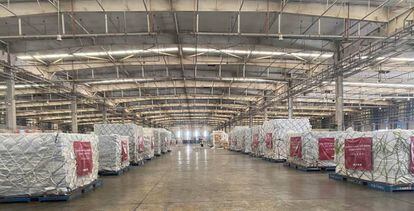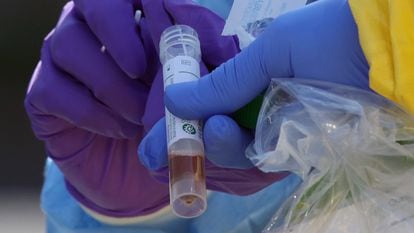Coronavirus in Spain: Five crises rolled into one
Overburdened hospitals, a shortage of protective gear and testing kits that never arrive. The pandemic is reaching its peak without enough resources or a real picture of the true spread of the disease
/cloudfront-eu-central-1.images.arcpublishing.com/prisa/434M7BYTCVEGVBC3OKDOAUKISM.jpg)
As Spain approaches – or perhaps has already reached – the peak of the curve of coronavirus infections, hospitals are filling up with patients requiring hospitalization and intensive care, and health workers are feeling increasingly defenseless.
Through social media and labor union representatives, these workers are offering daily examples of ingenuity as they craft protective gowns out of surgical bedsheets or reutilize disposable face masks. Meanwhile, the fast testing kits that the government has been promising for days have yet to be introduced in hospitals, which are still using the slower but more reliable polymerase chain reaction (PCR) system. In the hardest hit regions such as Madrid and Cataluña, only seriously ill patients and health personnel are being tested, making it impossible to know how many people are really infected.
On Thursday it emerged that the fast coronavirus tests that the Spanish government has purchased from a Chinese supplier do not work properly. The tests, which were manufactured by the Chinese company Bioeasy, have a sensitivity level of 30% when this should be 80%, according to a source familiar with the situation.
Meanwhile, workers specializing in the care of dependents have been requesting protective gear and equipment for weeks. Senior homes in particular have become a hotspot for coronavirus transmission.
Face masks

A large hospital can use as many as 5,000 surgical masks (the simplest type of facial protection) in a single day. This illustrates the magnitude of the need for this kind of material, as well as gowns, gloves and protective eye gear, which medical personnel need to treat infected patients.
On Wednesday, associations of physicians, pharmacists, nurses, dentists and veterinarians issued a joint statement in which they said that the 721,000 professionals they represent are in a situation of “complete defenselessness,” working in “inadequate and very risky sanitary conditions” because of the supply shortage.
According to Health Minister Illa, 550 million face masks and 11 million gloves will be shipped to Spain over the coming eight weeks. The question on everyone’s lips these days is, why did Spain not have a strategic reserve of healthcare material to prepare for such an eventuality? Experts consulted by this newspaper, who spoke on condition of anonymity, said that it is not only Spain but all European countries in general that failed to take note of the SARS and MERS outbreaks, unlike Asian nations. There was no stock of medical equipment to face a pandemic, and by the time the latter broke out, the global demand for supplies made it very difficult to make last-minute purchases. In an interview on the television network Telecinco, Madrid regional premier Isabel Díaz Ayuso admitted that “purchasing material from other countries right now is frankly complicated.”
Test kits

Despite promises that new, faster testing kits would be rolled out days ago, when the material finally did arrive it emerged that its reliability was too poor to be an effective tool of detection. In the meantime, overburdened microbiology labs at public hospitals are still handling up to 800 samples a day using the polymerase chain reaction (PCR) system, which is very reliable but takes around four hours and requires highly specialized equipment and personnel.
The new, faster testing kits that do not need to go through a lab and provide results in 10 to 15 minutes were supposed to signal a turning point in the effort to determine the real extent of the coronavirus in Spain.
Ventilators
Many intensive care units in the Madrid region are already at twice their theoretical capacity, and hospitals have been forced to set up critical care beds in other units or even inside surgery rooms, which are hardly being used now that all non-essential operations have been placed on hold.
But the beds and the furniture are just the most simple elements of an intensive care unit. Coronavirus patients in serious condition typically develop bilateral pneumonia, which requires the use of a ventilator to help them breathe. But no hospital has the number of ventilators required by the current crisis, and thus they have become one of the most sought-after medical devices in the international market.
But there are many buyers and few ventilators in stock, as countries scramble to acquire medical equipment. Minister Illa has said that more ventilators will be shipped to Spain between now and June.
In the meantime, some hospitals are making their own purchases without going through regional or central health authorities. Madrid’s La Paz hospital has used an emergency provision to acquire Philips ventilators, electrocardiography equipment and other material, directly and without tender. In documents that EL PAÍS has seen, the hospital says that “the number of patients suspected [of coronavirus] is growing exponentially” and that “it is of vital importance to have a stock of [ventilators] in our facilities.”
Care homes

Many workers at care homes are being quarantined in a sector that is also in dire need of more protective gear and testing kits. After senior residences became hotspots of coronavirus outbreaks, the government said that their situation has become a priority and that employees will be tested. But on Wednesday the order had yet to be published in the Official Gazette.
Official figures from 2018 show 5,457 residences in Spain serving nearly 277,000 people. Unions and associations have been requesting resources for weeks. “We’ve reached this point very late in the game, if we had acted earlier, this could have been prevented,” said Antonio Cabrera, a health officer with the labor union CCOO.
“Residences are social centers, not health centers. Companies have protection equipment against infectious diseases to treat a few patients, but we could not possibly be prepared for an epidemic,” said Jesús Cubero, secretary general of the industry association Aeste. “And we are having problems sending material to our centers. Last week we had material confiscated at [Madrid’s] Barajas airport when we were going to send it to Tenerife and Gran Canaria.”
Home assistance
Over 450,000 elderly people receive home assistance, according to 2018 figures from the public social services agency Imserso. Unions have also been demanding protective gear for the workers who go to seniors’ homes to help them with cleaning, cooking and personal hygiene. The fear of contagion goes both ways: some elderly people are refusing to let the workers in. And some of the latter are quarantined in their own homes.
Antonio Cabrera, of CCOO, believes these services should be reorganized in order to keep serving only the most essential needs while minimizing the risks.
English version by Susana Urra.
/cloudfront-eu-central-1.images.arcpublishing.com/prisa/XKUQIXSPBRCUFGLT5PTFC5TPAM.jpg)











































